- Home
- Helen Forrester
Three Women of Liverpool Page 3
Three Women of Liverpool Read online
Page 3
v
Emmie descended from the tram and walked briskly down a side street towards her brother’s house. The wind sent bits of paper skittering before her, and a red-faced baby, which seemed to have got dust in its eyes, was wailing unhappily in a pram set outside one of the front doors. In a gutter, two small boys in brown woollen jerseys were quarrelling loudly over their coloured glass marbles.
“Evenin’, Miss Thomas.”
At the sound of the deep Irish voice, Emmie’s lips clamped together. She half turned towards the lanky man in blue air raid warden’s overalls, who had fallen into step with her. His battered old retriever, Sarge, nosed between them as if anxious not to be ignored, and she bent to stroke his dusty muzzle. “Evening, Mr Donnelly,” she replied a little stiffly, uncertain how to treat him.
Patrick’s father, with his shrieking wife and bevy of unwashed children, had been, according to Gwen, a no-good out-of-work until he had been made a warden. “Keeps fighting cocks, if you please. Says a bad shoulder keeps him out of the army, ha! For ever shouting at you to ‘put that light out’. Never seems to miss the slightest chink in your blackout curtains. Thinks you’re signalling to the Jerries if you so much as carry a candle down the yard when you got to go to the lawie. Work? He lives the life of Riley.”
For his part, Conor Donnelly regarded Gwen and David Thomas as worse than a packet of starch, with their highly polished and scrubbed house front, their ritual of Sunday clothes and chapel-going, their disapproval of little boys who sometimes got caught short and piddled on the pavement, and ate conny-onny butties while sitting on their adjacent front doorstep. Ellen Donnelly had expressed the opinion that, “Them holier-than-thou types is the worst. That Mari’ll be in trouble with the boys in no time at all, at all.”
Conor Donnelly could not imagine how anybody could endure such a regimented life, without even an occasional bout of drinking or fighting to break the monotony. Of course, since he had become an air raid warden he had had to mind himself a bit. He had to stay sober while on duty and be a bit careful when he was carrying stolen goods for a small group of friends who preyed on lorries serving the docks.
When he and his family had been bombed out in the previous autumn, the city had rehoused him in the empty row house next door to Mr High and Mighty David Thomas, plumber. That bombing had been a basketful, that had. Poor little Ruby, his eldest daughter, and old Sarge had been buried for nearly four hours. A bloody miracle that the rest of them had been at the pictures at the time.
Miss Thomas, now she was different. She was polite to his wife and sometimes she made jokes with the kids. On Easter morning she had filled Ruby’s hands with toffees – must have given her most of her ration – to share with the other kids. She was a very quiet woman, he mused, but with a bit of encouragement from the right fella she might be more lively than she appeared. His face crinkled up in a grin, as she glanced up at him. He ventured a mild joke and was rewarded by a shy laugh.
Emmie forced herself to attend to what he was saying. With his face a polished mahogany from years of inadequate washing and his long, yellow teeth, he was an oddity to her; yet his sheer bouncing gaiety was infectious and she could understand why he had been chosen as an air raid warden – he would be a real tonic if you were in trouble.
They turned towards their adjoining front doorsteps. Conor pushed open his unlocked door, while she inserted her key into her brother’s carefully burnished Yale lock. Before he entered, Conor turned to point up to the sky, where a few clouds were building and a slight haze was dulling the sunshine.
“Bit o’ luck and them clouds’ll form a nice cover afore midnight. Should mean no raid.”
“Aye. It’s been over quiet lately, hasn’t it? Makes you wonder what’s brewing.”
Conor nodded agreement. “Well, keep yer fingers crossed.”
“I got to work the late shift at the canteen tonight, so I’ll be up and about anyways,” Emmie confided.
vi
As usual, the slam of the Donnelly’s front door caused a slight shudder to pass through the Thomases’ house and rattled the wooden signboard nailed to their door. The faded board announced David Thomas, plumber, est. 1914. Prompt attention.
The noise immediately brought Gwen Thomas out of the back kitchen. She clucked fussily, as clearly through the dividing wall came the sound of Ellen Donnelly’s strident voice above the shriek of a child. Conor’s voice rumbled back.
“Really! Slammin’ t’ door like that! Brings all the dust down. And me just finished cleaning.” Red-ringed, faded blue eyes looked impatiently up at Emmie, as Gwen licked her finger and ran it along a ledge to pick up an offending grain of dust.
Emmie hung up her coat, gas mask and handbag on the hall peg. While she nerved herself to deal with Gwen, she picked up the floppy, brown carrier bag given to her by Robert. She was always anxious not to break up her tenuous housing arrangement by letting her bitter, pent-up resentment burst forth at Gwen’s never having given her the slightest help with her parents. She was grateful for David’s protection and did not want to move until she was married. Though she was now paying very adequately for her lodgings and she also helped Gwen in the house, Gwen never considered it necessary to thank her and was often barely civil.
Nothing annoyed Gwen more than dust and dirt and untidiness, and her shining, neat house indicated how successfully she dealt with them. Almost invariably wrapped in a black cross-over overall dotted with blue forget-me-nots, she was a bundle of muscles. Because she kept running her fingers through her greying red hair with its tight natural curl, it tended to stand up in a wild bush. Tonight it was in particular dissarray, indicating a trying day’s battle with her household gods.
“T’ glazier hasn’t got no glass for Mari’s bedroom window,” she grumbled, as she followed Emmie into the living room, where a cheerful fire blazed in an old-fashioned cooking range gleaming with blackleading; at its side, the brass tap of the hot water tank winked in the light of the darting flames.
David Thomas was seated in his armchair beside the fire, and he looked up from his perusal of the Liverpool Echo. “’Allo, la,” he greeted Emmie, and then he said to his wife. “I’ll nail a bit o’ plywood over t’ window when I’ve had me tea. It’ll be safer for Mari than glass.”
“Where is Mari?” inquired Emmie, smiling down at her brother.
“She’s away out to tea with her friend, Dorothy.” Gwen clicked her tongue and reverted to her grievance. “I’ll teach that lad, even if his mam won’t. He’ll not get his arrow back.” She continued to grumble, as she went through to the back kitchen. Emmie followed her with the carrier bag.
She interrupted Gwen’s tirade, by saying, “Robbie set a line while the tide was out yesterday. He caught ten whiting and he’s sent you two. They feel real heavy.”
“That’s proper kind of him, I’m sure,” replied Gwen coldly. She seized a pot of boiled potatoes and deftly drained the water from them into the sink. Through the ensuing steam, she added with a sniff, “Being engaged to a fisherman has its advantages, I suppose. T’ fishmonger didn’t have so much as a cod’s head left today, by the time he got to me. Ever so long, the queue was.”
“Well, there’s the makin’s of a nice dinner here,” Emmie soothed.
“Humph,” grunted Gwen. “Here, take the potatoes and put them on the table for me.” She sighed. Provided Emmie could be prevented from taking her parents’ furniture with her, she would be thankful when the woman got married and left. When the pieces had been moved into the house, nothing had been said as to the ownership; but Gwen burnished them determinedly; they were hers, because David was the eldest and should inherit.
What little Emmie said about the furniture indicated that she took it for granted that, since she had lived with it all her life, the furniture belonged to her. Besides, in the middle of a war, where else would she get furniture from for a home?
She had brought Robert home for tea one Sunday and Gwen had made it clear tha
t she strongly disapproved of a woman of sober years suddenly marrying a man she had known less than four months. It did not occur to Emmie that Gwen had been smitten by a lingering envy of her blatant happiness, her obvious contentment.
“I must hurry,” said Emmie, as they sat down to their meal. “I got to be in the canteen by seven. Mrs Robinson and the others were ever so kind about me engagement, giving me a bit of time off when Robbie was free.”
Gwen responded tartly, “Well, I hope you’re doing the right thing.” She stirred her tea hard, in the hope of making half a teaspoonful of her sugar ration sweeten it adequately. She made a face when she sipped it. “Picking up a man like that don’t seem like a good start to me.”
Emmie ached to slap her.
“Now, Gwen,” her husband warned. “Emmie got to know him in the canteen. That’s not picking up. And he took her home to Hoylake to meet his mum and dad – quite proper. He’s given her a nice ring, too.”
Gwen shrugged her shoulders slightly and poured another cup of tea. Emmie kept her eyelids down and wondered if Gwen had ever been in love with poor David – or with anything except the shiny aspidistra in the front room or the bronze soldiers looking down at them from the living room mantelpiece.
To distract Gwen, David said, “I’ll get me tools and do Mari’s window.”
That brought Gwen back to her favourite complaint – the Donnellys. “We ought to have moved from here years ago – the whole of Toxteth’s gone to pot. The minute Mrs Tasker died next door I knew we’d never get decent neighbours again.”
“House were empty for months. T’ landlord held out for too high a rent.” David gritted his teeth as he pushed away his empty plate.
“Oh, aye. And how does he pay seventeen shillings a week on an air raid warden’s wages, I’d like to know. Maybe it’s true that he’s hand in hand with a gang o’ dock thieves.”
“Gwen!” David was shocked. “That’s just idle gossip. Because he sometimes has lipsticks or silk stockings for sale? He could buy ’em easy from a merchant seaman on the New York run. It don’t make ’im a thief.”
vii
The sharp wail of the air raid siren made David jump. He had been washing himself in the kitchen sink, in preparation for going to bed, and he stood in his undervest and trousers while he dried the back of his neck. He was numb with fatigue after a long day working on the intricacies of the plumbing of the Royal Infirmary, and he felt again a small, choking pain in the middle of his chest, a pain that had been bothering him occasionally for a couple of weeks.
“Blow them,” he muttered, and hastily finished drying himself.
He leaned over the sink to pull back the blackout curtain and look out of the window. There was enough moonlight to cast a shadow of the house across the back yard. Behind the neighbouring chimneys, searchlights suddenly sent seeking fingers across a starry sky. It was much too light for safety. He dropped the curtain into place, making the flame of the candle on the drainboard dance, as Gwen came hurrying from the living room. She carried a steaming kettle in one hand, and the warning had obviously flustered her.
“For goodness’ sake, get your dressing-gown on and something on your feet. We’ll have tea on the cellar steps. What a nuisance they are.”
As she flung two teaspoonsful of tea into the pot, she went on anxiously, “Our Mari’s not in yet, from Dorothy’s. She’s real late. I’ll have to have a word with that young lady.”
“I could go and fetch her,” David offered, without much conviction.
“No. It’d just mean two of you out in the flak. You get out the blankets and cushions and take them on to the cellar steps, while I do the tea tray.” She jumped suddenly, as the steady boom-boom of anti-aircraft fire made the windows rattle. Sometimes the guns sounded more menacing than the bombs did.
David would have been thankful to crawl into bed and risk being blown out of it. He did not feel, however, that he could go to bed while Mari was still not home, so he obediently arranged the cushions on the cellar steps, for them to sit on. With the slope of the staircase overhead, this spot offered good protection and the least likelihood of being crushed.
With a sigh, he sat down and arranged a blanket over his knees. While Gwen held the tea tray a little high, he tucked another blanket round her. He took the candle from the tray and set it on a small shelf above their heads. Gwen scolded, “Be careful, stupid. You’ll upset the tray.” She stirred the pot balanced uncertainly on the tray on her lap, while he listened for the battery to start firing in nearby Princes Park; the sound would indicate to him how close the raiders were. Beyond the rumble of more distant guns, however, all he heard was Donnelly’s front door slam. Likely, Donnelly was in for a busy night.
Gwen’s lips curled. “That’ll be him goin’ down to the wardens’ post. Bangin’ the door, as usual. No manners, that man.”
Their own front door slammed. Quick footsteps ran along the narrow, linoleumed passage, then stumbled through the dark living room and into the kitchen.
“That you, Mari? Come on down, quick now.”
Mari was panting, as she whipped a cushion off the shelf and almost slithered down the concrete steps, her long bare legs flashing white in the candlelight.
She sat down close to her mother. Like many families seeking refuge in this safest corner of the house, they always sat very tightly together, so that if the building was hit they either died or survived together.
Gwen felt her trembling and lifted down the candle to have a closer look at her. The girl’s face was blenched and her eyes stared unblinkingly at her mother from behind the candle flame.
“There, there, luv. No need to be scared. You’re safe home now,” she told the girl quite gently.
Her father turned towards her and added reassuringly, “It don’t sound as if they’re interested in the south end of the town tonight.”
Above them, a number of aeroplane engines throbbed increasingly loudly.
“They’ll be some of ours,” David declared authoritatively. “Always know the difference by the sound o’ the engines.”
His words were immediately belied by a shrieking whistle passing over them. Instinctively, they ducked and flung their hands over their heads for protection. The tea tray on Gwen’s lap rocked perilously. There was a moment of silence: then a deafening explosion which shook the whole house above them. They waited, like rabbits hiding in a thorn bush from a fox. A piece of plaster plopped from the ceiling on to the tray, and a cloud of thin dust enveloped them.
Mari buried her face against her mother’s bony legs and whimpered in terror. The next bomb in the rack would hit them; she knew it. It would be a judgment on her for what she had allowed Patrick Donnelly to do to her.
He had been bothering her for weeks, touching her when she passed him, holding her against the wall of the alley one day, when she had run down it to visit Dorothy; not hurting her, just making her feel funny when he pressed himself against her. It had been most funny-peculiar, because, despite all her mother’s warning about not letting a man come near her, she had wanted him to remain close. Perhaps the warning didn’t apply to boys, she argued to herself.
Tonight, he had pushed her into a street air raid shelter, which nobody used except as a urinal. He had held her tightly against the wall and her silent struggles had been of no avail against his considerable weight. When in scared despair, she had stopped wriggling, he had lifted her skirt and gently stroked between her legs. And she knew now that she was on her way to hell. It had felt wonderful, incredible; and he had laughed when, not understanding the driving impulse, she had put her arms round him. He had said it was nothing to what he could do. If that was nothing, she decided without really knowing why, it was a good thing that the air raid warning had begun to shriek and that they had both run for home.
Now the bombs were falling all around her. God must be very angry with her.
“Incendiaries! Incendiaries!” Conor Donnelly could be heard, calling his firewatchers to t
he street.
Despite his wife’s protests, David insisted on going out in his dressing-gown to check his roof, back and front. He came back very soberly and hauled the blanket round himself again. “Looks like the whole town’s alight. Hope our Emmie’s all right.” Then to his crouching daughter, he said, “Don’t take on so, Mari. Everything’s going to be all right. We’re quite safe here on the steps.”
You don’t know what a wicked daughter you’ve got, thought Mari, not lifting her head from her mother’s knee. God could do anything to us tonight.
viii
As the guns in Princes Park began to roar, Ellen Donnelly finished spreading the washing on her wooden airer in her living room and then heaved the heavy rack up to the ceiling again and tied the rope firmly to hold it there. The clothes began to drip depressingly onto the rag rug below and onto the otherwise bare floor. A few droplets reached baby Michael asleep in a battered easy chair. She edged the chair away from under the rack and flung her black woollen shawl over the sleeping child.
There was a quick patter of bare feet on the stairs, and her eldest daughter, Ruby, still in her clothes, dashed into the room. She was brought up short by the sight of her mother seating herself calmly on a wooden chair in front of the fire.
“Mam, shall I bring Brendy and Nora down? The guns sound awful.” Her voice was tightly constricted, as she tried to control her panic. After the dreadful experience of being buried in the ruins of their former home, the sound of the air raid warning always brought her close to a bout of hysterics. Her breath came in tight gasps and, from under a fringe like a Skye terrier’s, eyes gleamed with tears.
“Aye, luv. Coom ’ere.” Her mother held out a stout red arm to her and thankfully the skinny 12-year-old cuddled close to her heavy breast. “It ain’t likely we’ll be bombed again.”

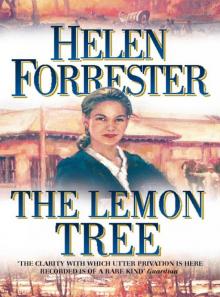 The Lemon Tree
The Lemon Tree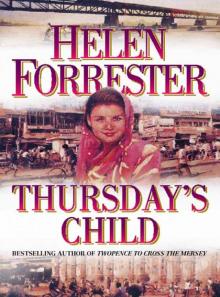 Thursday's Child
Thursday's Child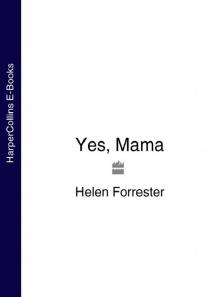 Yes, Mama
Yes, Mama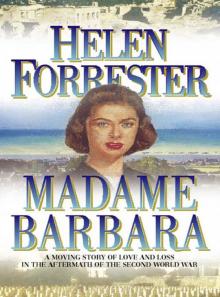 Madame Barbara
Madame Barbara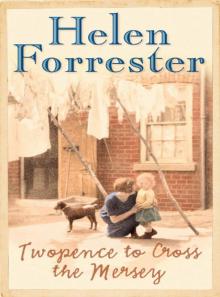 Twopence to Cross the Mersey
Twopence to Cross the Mersey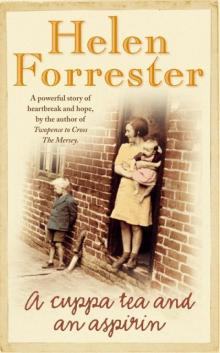 A Cuppa Tea and an Aspirin
A Cuppa Tea and an Aspirin The Moneylenders of Shahpur
The Moneylenders of Shahpur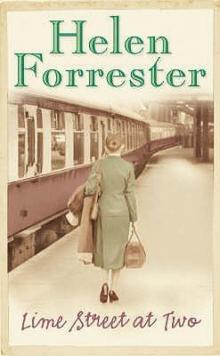 Lime Street at Two
Lime Street at Two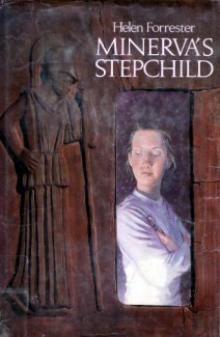 Minerva's Stepchild
Minerva's Stepchild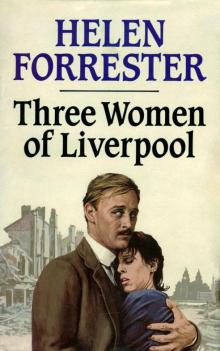 Three Women of Liverpool
Three Women of Liverpool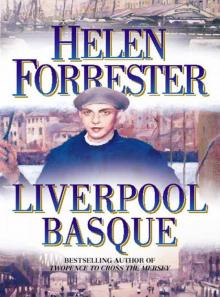 The Liverpool Basque
The Liverpool Basque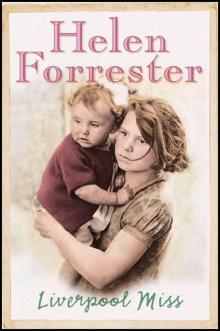 Liverpool Miss
Liverpool Miss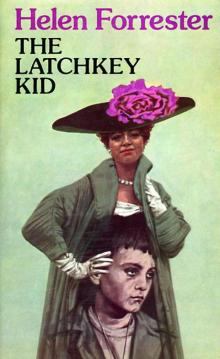 The Latchkey Kid
The Latchkey Kid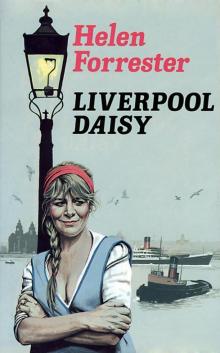 Liverpool Daisy
Liverpool Daisy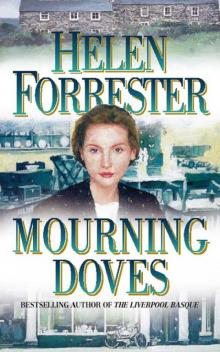 Mourning Doves
Mourning Doves